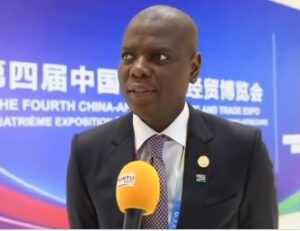President Cyril Ramaphosa has conveyed his intention to officially endorse the National Health Insurance (NHI) Bill, signaling a pivotal shift towards universal health coverage in South Africa. In a recent engagement with the Cape Town Press Club, Ramaphosa articulated the critical necessity for nationwide health care access, affirming the inevitability of the bill’s enactment.
“There is a pressing need for universal health coverage in our nation,” Ramaphosa emphasized, leaving no room for doubt about his stance on the legislation. “The enactment of the NHI Bill is not a matter of ‘if’ but ‘when’.”
Despite the clear path forward outlined by the President, the bill has polarized opinions across the country. A segment of the South African population stands in firm support of the legislation, while another vocal group remains opposed, challenging the bill’s premise and potential implementation.
Following a rigorous legislative journey, the NHI Bill received the green light from the National Council of Provinces, having been previously ratified by the National Assembly. This progression set the stage for President Ramaphosa’s crucial final review and signature.
The discourse surrounding the NHI Bill has not been without contention. Political factions and various stakeholders have voiced their dissent, with some going as far as threatening legal action should the bill be signed into law. Concerns have been raised regarding the bill’s constitutionality, practicality, and overall integrity, with criticisms pointing to a hasty parliamentary process allegedly overlooking substantive contributions from concerned parties.
“It’s on my desk,” Ramaphosa disclosed regarding the current status of the NHI Bill.
“My role as President demands a thorough examination and analysis of the bill, ensuring all legislative processes have been duly observed.”
Amidst the debate, the President acknowledges the diverse perspectives surrounding the bill, recognizing the necessity to balance the various concerns and insights presented by its proponents and critics alike. This approach underscores a commitment to deliberate consideration and due process.
The NHI Bill stands as a cornerstone of the government’s ambition to achieve universal health coverage, aiming to dismantle existing disparities within the healthcare sector by providing free access to healthcare services for all South Africans.
Ramaphosa reiterated his resolution to sign the bill into law, stating,
“The NHI Bill will soon be transformed into an Act. This is an inevitable development in our journey towards comprehensive healthcare access for all.”
However, the timeline for this pivotal action remains unspecified, leaving stakeholders in anticipation of the bill’s formal adoption.
As the NHI Bill awaits its final endorsement, the nation stands at the cusp of a significant healthcare transformation, poised to redefine the landscape of medical services and accessibility in South Africa.
What is the National Health Insurance Bill of South Africa?
The National Health Insurance (NHI) Bill of South Africa represents a fundamental shift towards achieving universal health coverage in the country. Here are 10 straightforward facts to understand its essence and implications:
- Universal Health Coverage Goal: The NHI Bill aims to ensure that all South African citizens and residents have access to quality healthcare services without suffering financial hardship.
- Single Payer System: The NHI will operate as a single-payer healthcare system, with the government acting as the sole purchaser of healthcare services from both public and private providers.
- Funded through Taxes: The financing of the NHI is expected to come from general tax revenue, including possible new taxes such as a payroll tax on employers and a surcharge on personal income tax.
- Comprehensive Healthcare Services: The NHI will cover a comprehensive range of health services, from primary healthcare to more complex and specialized care, based on a defined package of health services.
- Prepayment Mechanism: The system is based on prepayment, meaning that funds are pooled in advance, allowing for equitable access to health services regardless of an individual’s ability to pay at the point of service.
- Improving Health Equity: One of the NHI’s primary goals is to address the current disparities in health access and outcomes between different socio-economic groups within the country.
- Private and Public Sector Role: While the government will be the main funder, the NHI bill allows for participation from both public and private healthcare providers, subject to accreditation and adherence to set standards.
- Phased Implementation: The introduction of the NHI is planned to be gradual, with various pilot projects already having been initiated to test the system’s feasibility and effectiveness.
- Controversial Aspects: There has been considerable debate and opposition to the bill, with concerns over its impact on the economy, the private healthcare sector, and the government’s capacity to manage the system effectively.
- Legislative Process: Before becoming law, the NHI Bill must pass through several legislative stages, including approval by both houses of Parliament and a sign-off by the President, after which it will be enacted into law.
The NHI Bill is a bold step towards transforming South Africa’s healthcare landscape, aiming to create a more inclusive, equitable, and efficient system that meets the health needs of all its citizens.

















